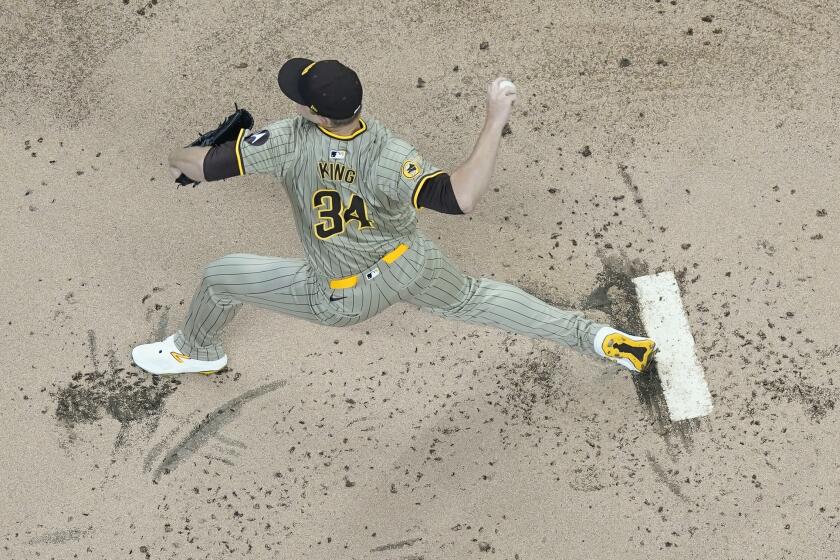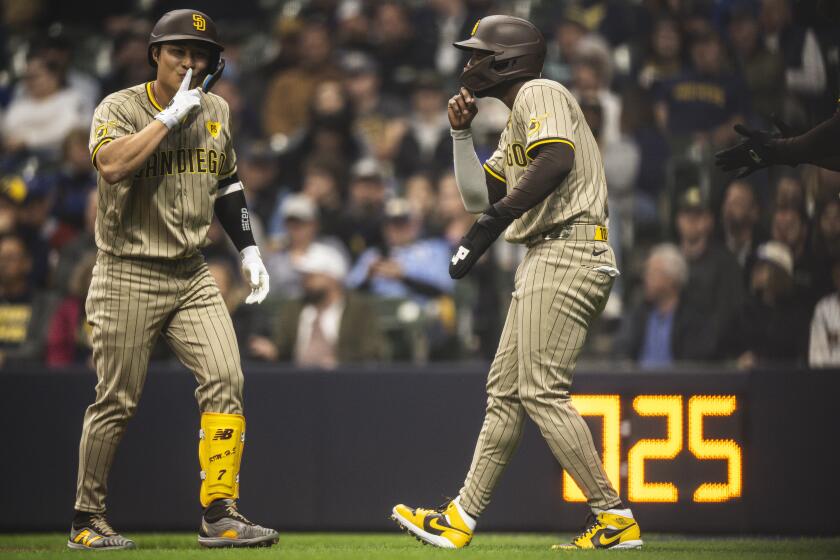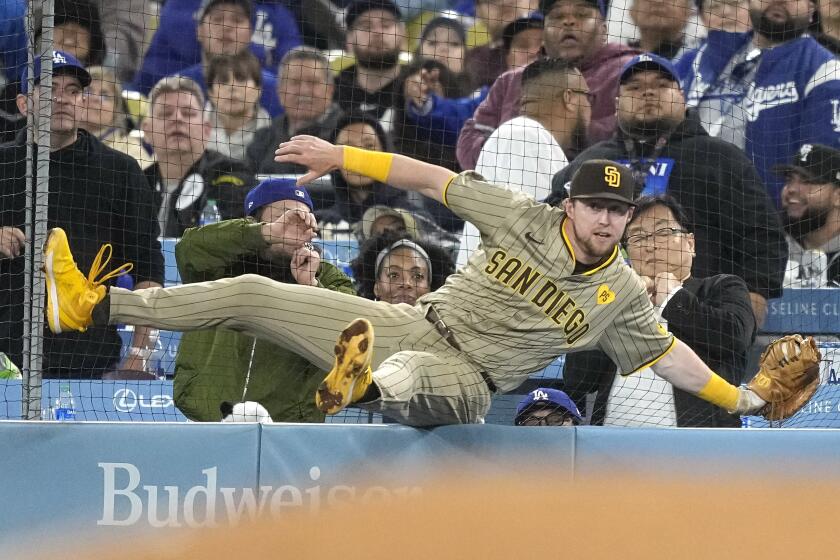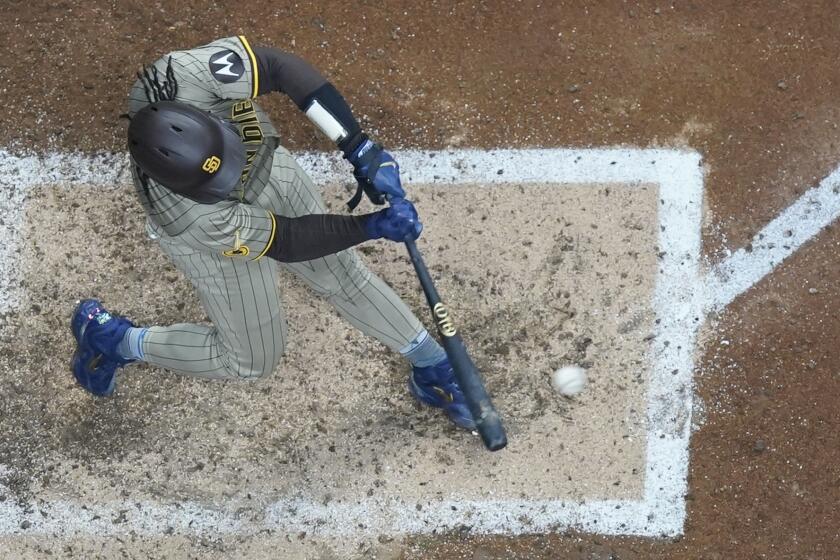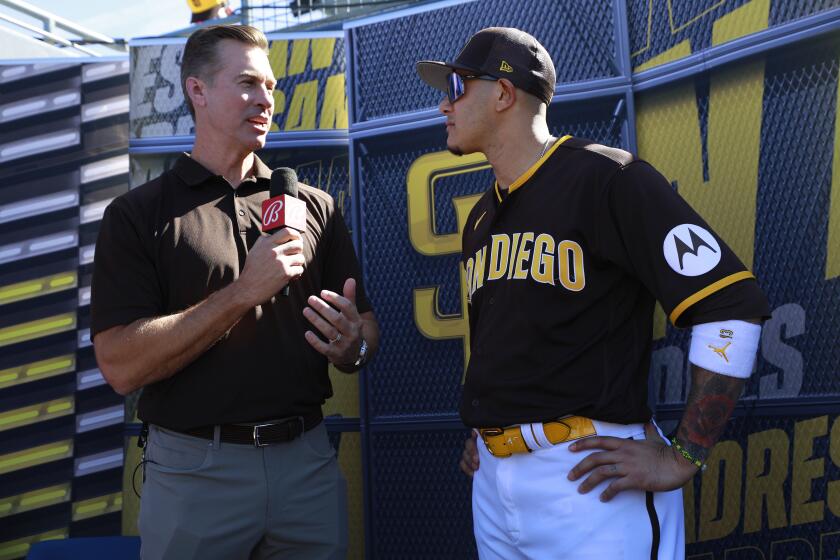Yankees batter Paddack, as Padres hardly hit on way out of New York
Chris Paddack stood on the mound his imagination had long ago taken him and so many thousands of others.
“As a kid, you tell your friends, ‘Bases loaded, two outs, bottom of the ninth at Yankee Stadium, here it is,’ ” the 23-year-old Texan said late Wednesday afternoon. “… That was a dream come true being able to pitch here at Yankee Stadium.”
By the end of a 7-0 Padres loss, a nightmare for someone who believes he’s going to throw a perfect game every time he pitches, there was perspective.
“It’s frustrating,” Paddack said. “You have to tip your cap. They’re good hitters. But if I execute those pitches down or up, setting up different off-speed pitches, setting up my fastball, it’s a different result.”
There was a promise.
“I’ll learn from it, leave it all on the field, turn the page and get ready for the Phillies,” he said of his scheduled start Tuesday at Petco Park. “Like I did two weeks ago against the Dodgers, had a tough outing. Being able to bounce back. That’s how you make a name for yourself.”
And there was praise.
“I think the guys were excited coming in today — an opportunity to face this guy that’s obviously kind of taken the league by storm,” said Yankees manager Aaron Boone. “He is and he will be a great pitcher, so I think they were excited. I think they had a really good game plan. … We got a glimpse of how talented a pitcher he is. For us to be able to go out and those guys to execute in a big way against a big pitcher, I think the energy was high on a day game after a night game very early on in the dugout.”
In sending the Padres home with a 3-3 record on this international interleague road trip, which began with two victories in Toronto, the Yankees won their eighth straight series.
They did it by getting more hits (six), more home runs (three), more earned runs (four) and more solid contact against Paddack than he had allowed in any of his first nine big-league starts.
The right-hander struck out six in five innings. His problem was a portion of the first two.
The first two Yankees batters homered, and so did the seventh.
D.J. LeMahieu’s 403-foot blast to left field came on an 0-2 change-up that stayed up. Luke Voit followed by ripping an 0-1 fastball left up 419 feet to center. With one out in the second inning, Gio Urshela sent a 1-2 change-up also left up 371 feet and into the seats beyond left field.
“The guy pretty much went from Double-A to The Show,” Voit said. “I’m sure he’s never pitched in New York. So I’m sure he’s going to come out (pumped up). He wanted to prove that his first month-and-a-half wasn’t anything that (fluky). For us to kind of get out to that lead and score four or five off him (was big).”
The Yankees added a run when LeMahieu led off the fifth inning with a walk, went to second on a grounder, to third on a flared single and scored on Brett Gardner’s sacrifice fly. Padres reliever Adam Warren, a former Yankee, gave up a run in the sixth and two more in the seventh.
Meanwhile, the Padres were largely unable to execute their planned patience against James Paxton and four relievers.
They did not get a hit off Paxton in his first four innings returning from the injured list. They did not get a hit of Chad Green in the fifth.
Up 4-0 in the sixth inning, the Yankees turned to Adam Ottavino, who had allowed 13 hits in 25 1/3 innings this season. Wil Myers was the first batter to face him, and he fought off a fastball barely on the inside edge of the plate and sent it over second base, where it went in and out of the LeMahieu’s glove and was ruled a single.
Austin Allen’s eighth-inning double and singles by Eric Hosmer and Hunter Renfroe in the ninth were the Padres’ other hits.
“Later in the game we calmed down a little bit, did some good things,” Renfroe said. “It just kind of didn’t happen. … Paddack did great. He threw three bad pitches. They made him pay for it.”
The ice on Paddack’s right arm had hardly begun to melt before he had assessed his issues, which were readily apparent and now up to him to rectify.
His change-up didn’t accomplish its usual mischief. His fastball didn’t jump until later innings. His early pitch sequences were perhaps not what they could have been. The strike zone he almost always attacks on the edges swallowed his pitches this time, resulting in him hearing a lot more sound of lumber hitting cowhide and rubber coated cork.
Paddack entered the game with the major leagues’ second-lowest ERA (1.93) among a number of dazzling statistics. And the Padres had won seven of his nine starts, only one of which was close to being like this.
But where the Dodgers wore him down on May 14, taking balls and fouling off pitches to get to ones they could better hit en route to scoring six runs (three earned) on five hits, the Yankees jumped on Paddack.
They hit him harder and more often than anyone had.
Paddack (4-3) lives near and inside the strike zone. Thrives there. His 73.8 percent first-pitch rate entering the game led all qualifying starters. So did his overall strike rate of 71 percent.
It is the fringe location of those strikes that works, and a mix of his deceptive change-up with a mid-90s fastball that has kept hitters off-balance.
No one had allowed fewer well-hit balls on pitches in the strike zone. On the 133 times batters had put a strike from Paddack in play, just 14 had been well-hit — an exit velocity of at least 97 mph.
He threw 61 strikes among his 86 pitches (70.9 percent) on Wednesday. He threw a first-pitch strike to 16 of the 24 batters he faced.
But those strikes, especially early, were generally not of their usual quality. A few times, the Yankees just didn’t wait around, three times barreling balls on the first pitch of an at-bat.
The Yankees smacked six pitches in the zone with an exit velocity of 97.7 mph or faster in the first two innings. The five that were hits were all 100.3 mph or faster.
The Dodgers and Mets both hit four balls with an exit velocity of 100-plus mph against Paddack. The Reds had three. Atlanta and Arizona (first meeting) had two apiece. The Cardinals hit one. The Diamondbacks didn’t hit one ball that hard on May 20th, Paddack’s most recent start. Neither did the Giants or Mariners.
The Yankees sent six balls (five hits) rocketing at more than 100 mph and eight at more than 97 mph.
They entered the game swinging at change-ups less than all but one other team. They feasted on them early Wednesday.
“It’s the big leagues, it’s hard to pitch here,” Voit said. “And credit (to him), he’s got good stuff. But we had a good game plan.”
Updates
3:01 p.m. May 29, 2019: This story was updated with postgame quotes and further reporting.
Go deeper inside the Padres
Get our free Padres Daily newsletter, free to your inbox every day of the season.
You may occasionally receive promotional content from the San Diego Union-Tribune.


